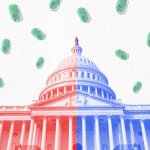The first U.S. COVID-19 contact tracing app built on Apple and Google’s Exposure Notifications system tools has launched in the state of Virginia.
The free COVIDWISE app for Android and iOS smartphones is supported by the Virginia Department of Health.
Much like others built on the API, the app passively uses Bluetooth to anonymously determine whether an individual has come into contact with another user who has a positive COVID-19 diagnosis within the last 14 days. This approach works as an alternative to more invasive GPS tracking.
If the app notifies a user that a contact potentially has COVID-19, it will provide guidance from the state’s Department of Health on what to do next and how to minimize the risk for further spread.
Want to publish your own articles on DistilINFO Publications?
Send us an email, we will get in touch with you.
WHY IT MATTERS
Now several months into its public health emergency, the U.S. is inching closer to the 5 million total cumulative case mark and now faces new pressures with school openings and the resumption of certain pre-pandemic practices. The scalable, privacy-focused contact tracing resource aims to support public health authorities in tracking down potential new cases and limiting new exposures.
Download and use of the app are voluntary, and those who find they aren’t comfortable with the system may delete the app at any time. This has led some experts to cast doubt about the effectiveness of these tools, as contact tracing apps can only be effective when adopted by a substantial portion of a population.
THE LARGER TREND
The first U.S. deployment of the Exposure Notifications API follows launches in 16 countries, according to a progress report from Google last week. The implementation could also serve as a vanguard for 19 other U.S. states and territories that the tech company said are exploring the tools as well.
Last week’s check-in also came with news of upgrades to the system itself. These included breakdowns of high- or low-risk exposures for public health authorities, cross-country interoperability and better communications regarding Android system settings that made it appear that Android versions of the apps would share location data.
Source: Mobihealth News







